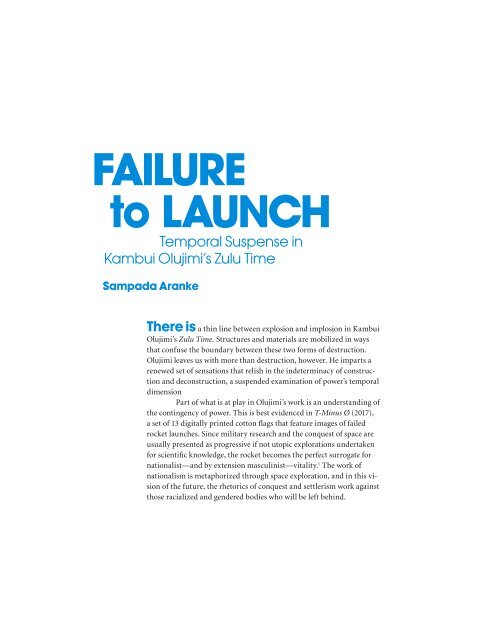Kambui Olujimi: Zulu Time exhibition catalog
This catalog is from the installation of this exhibition at MMoCA. It includes essays by Sampada Aranke, Leah Kolb, and Gregory Volk.
This catalog is from the installation of this exhibition at MMoCA. It includes essays by Sampada Aranke, Leah Kolb, and Gregory Volk.
You also want an ePaper? Increase the reach of your titles
YUMPU automatically turns print PDFs into web optimized ePapers that Google loves.
FAILURE<br />
to LAUNCH<br />
Temporal Suspense in<br />
<strong>Kambui</strong> <strong>Olujimi</strong>’s <strong>Zulu</strong> <strong>Time</strong><br />
Sampada Aranke<br />
There is a thin line between explosion and implosion in <strong>Kambui</strong><br />
<strong>Olujimi</strong>’s <strong>Zulu</strong> <strong>Time</strong>. Structures and materials are mobilized in ways<br />
that confuse the boundary between these two forms of destruction.<br />
<strong>Olujimi</strong> leaves us with more than destruction, however. He imparts a<br />
renewed set of sensations that relish in the indeterminacy of construction<br />
and deconstruction, a suspended examination of power’s temporal<br />
dimension<br />
Part of what is at play in <strong>Olujimi</strong>’s work is an understanding of<br />
the contingency of power. This is best evidenced in T-Minus Ø (2017),<br />
a set of 13 digitally printed cotton flags that feature images of failed<br />
rocket launches. Since military research and the conquest of space are<br />
usually presented as progressive if not utopic explorations undertaken<br />
for scientific knowledge, the rocket becomes the perfect surrogate for<br />
nationalist—and by extension masculinist—vitality. 1 The work of<br />
nationalism is metaphorized through space exploration, and in this vision<br />
of the future, the rhetorics of conquest and settlerism work against<br />
those racialized and gendered bodies who will be left behind.<br />
<strong>Olujimi</strong> takes the rocket’s promise and disturbs it, then; the<br />
rocket’s phallus wryly signals the doubleness of failed explosion as<br />
an ejaculation gone wrong for the nation and therefore for mankind.<br />
Each flag features one historic failed launch, the images of which are<br />
manipulated by the artist, layered upon themselves, and echoed in<br />
their repetitive presentation. What we see is multiple and spectacular<br />
attempted takeoffs: the pyrotechnics of failure right before the moment<br />
of collapse. What we’re given is a commentary on our current political<br />
moment not as exceptional nor isolated, but rather as part of a broader<br />
system of power in which our political present is a manifestation of the<br />
long durée of history itself.<br />
T-Minus Ø comments on the deep resonances between science<br />
and politics, space and nation, universality and patriotism. <strong>Olujimi</strong><br />
arranges these flags so as to proffer a salute, or at least a quiet repose,<br />
in which the viewer is asked to consider how the ambitions of scientific<br />
innovation might mark an affiliation with those nationalist and militaristic<br />
impulses that set these rockets in air. Importantly, these iterative<br />
objects stand in stillness indoors, taken out of their landscapes and<br />
stuck endlessly in their failures to launch. Throughout <strong>Olujimi</strong>’s work,<br />
time is trapped in the moment of explosion, at once spectacular and yet<br />
eerily static, a moment stuck without resolution.<br />
These are <strong>Olujimi</strong>’s time bends in <strong>Zulu</strong> <strong>Time</strong>. In his work,<br />
time sticks, suspends, holds still. Moments are anticipated, but never<br />
fully activated. Coordinated Universal <strong>Time</strong> (UTC), referred to commonly<br />
as <strong>Zulu</strong> <strong>Time</strong>, is a “universal” way of marking time, in which<br />
zero is the point of departure for hours, minutes, and seconds. Standard<br />
timekeepers have adopted UTC as the normative mode of time,<br />
therein reinforcing the West as timekeeper of modernity. 2 Experts<br />
insist that this use of “<strong>Zulu</strong>” has no direct relation to the Bantu people<br />
of South Africa and that the word is merely adopted from NATO’s phonetic<br />
alphabet in which the letter “Z” is signaled through “<strong>Zulu</strong>.” However,<br />
the naming points us to colonial methods of timekeeping used<br />
1. For more information on the intersections<br />
between space exploration, popular culture,<br />
and gendered representations, see: Constance<br />
Penley, NASA/TREK: Popular Science and<br />
Sex in America (London: Verso Books, 1997);<br />
Daniel Sage, How Outer Space Made America:<br />
Geography, Organization, and the Cosmic<br />
Sublime (London: Routledge, 2016); Peter<br />
Dickens and James S. Ormrod, eds., The Palgrave<br />
Handbook of Society, Culture and Outer<br />
Space (London: Palgrave, 2016).<br />
2. Jean Baudrillard, “Modernity,” in Encyclopaedia<br />
Universalis Vol. 12, trans. David James<br />
Miller (Paris: Encyclopaedia Universalis<br />
France, 1985), 424–426; Edward Said, Orientalism<br />
(New York: Pantheon Books, 1997).<br />
3. “Military & Civilian <strong>Time</strong> Designations,”<br />
<strong>Time</strong> Zones | Greenwich Mean <strong>Time</strong>, accessed<br />
February 27, 2017, https://greenwichmeantime.com/info/timezone/.<br />
6 7


















